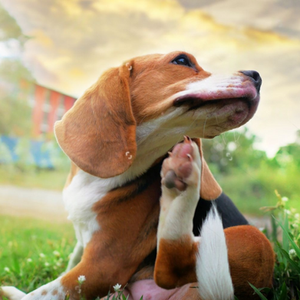Here Are Some Simple Ways To Help Your Pet's Digestive Tract Stay Clean and Healthy!
- Emanuela Visone
- Oct 6, 2021
- 3 min read
The Ultimate Health Insurance: Probiotics for Pets
The Ultimate Health Insurance: Probiotics for Pets Did you know that there is a direct relationship between your pet's present state of health and the billions of beneficial friendly bacteria that live in its intestinal tract? Did you know that these friendly bacteria aid your pet's body in producing essential elements such as hormones, vitamins and proteins needed for proper growth, immune function and healing? Did you know that these friendly bacteria keep your pet's intestines clean by feeding on putrefied waste, fungi, harmful bacteria, yeast, poisons and other nasty substances? We feel it's important to give you a brief "primer" on the beneficial effects of the most commonly known friendly intestinal bacteria, acidophilus and bifidobacteria (also called bifidus). We will also share with you why these microscopic critters are so vital and necessary for the health of your pet. We will also share with you some important information on the devastating ill-health effects that can occur whenever your pet's intestinal bacteria is compromised for any reason. Many types of bacteria (known as strains) live in the digestive tract. Usually they move in and establish colonies in the area of your pets' intestine where the acidity and other conditions are suitable for their own specific needs. Some of these bacteria can cause disease (pathogenic), others produce specific benefits (probiotic), while most show neither beneficial nor harmful effects. Studies have shown that friendly bacteria provide many health benefits: they produce B vitamins such as biotin, niacin and folic acid, prevent substances such as free radicals, pathogens, and undigested fats and proteins from penetrating the intestinal wall and entering the bloodstream, can help inhibit gas and bloating, provide crucial support for overall digestive system health and enhance the immune system (Barilla, p. 55). How do animals lose friendly bacteria? "The renowned medical researcher Reni Dubos found that when animals are psychologically stressed the health of their intestinal flora is adversely affected. He maintained that the factors which most influence the "friendly bacteria" are the use of antibiotic drugs and stress of various sorts. In case you are thinking that animals don't suffer stress (after all, they have it made-they eat, sleep and play!), think again. According to the Boomer Report, the fifth highest expenditure of pharmaceutical dollars are these spent on antidepressants for dogs." (Bennett, pgs. 13-14). Another factor that may damage the ecology of these friendly bacteria in your pets' intestine is chlorinated water. Chlorine in tap water may kill most of the friendly bacteria. Still another factor is commercial foods (not organically grown) which may contain antibiotic residues, herbicide or pesticide residues, and many food preservatives (most meats used in canned and dry foods are not organically grown). Acidophilus, bifidus and other strains of bacteria are so beneficial to your pets, it is only logical that you would want to keep a healthy population of friendly bacteria active in your pets' gut. With daily exposure to so many harmful substances, you need to look for ways to make your pet's digestive tract a less hostile environment. First, you can reduce your pet's intake of those substances which kill friendly bacteria. As much as you can, try to avoid the use of antibiotics for your pets, feed them foods without toxic residues and make sure their drinking water is without chlorine. Second, you can get the best results by adding probiotic supplements to your pet's diet. We offer your pet one of the most unique probiotic formulas ever introduced in the market. Through the efforts of respected nutritional scientist Dr. Khem Shahani and enzyme specialist Viktoras Kulvinskas, a very effective probiotic product was developed. This product combines eight key "good bacteria" that are micro blended with wild crafted blue green algae, Jerusalem Artichoke and a blend of Acerola and Rose Hips to further promote the growth of these friendly bacteria. To summarize, a good health plan for your pet should include knowledge and use of the friendly bacteria that can be commonly found in and on natural raw unprocessed foods. As much as possible, avoid the harmful factors that disrupt or destroy the beneficial intestinal ecosystem for your pets. Feed them lots of real organic foods, give them pure water, and avoid the frequent use of antibiotics for your pet, unless it is an emergency. Supplement its organic diet with our top-of-the-line quality probiotic supplements. Is it necessary to give your pet probiotic supplements? Absolutely. Your pet needs probiotics even as much as it needs food, because without both, their digestive system doesn't run at peak efficiency. With probiotic supplementation, you are assuring the strength of your pet's immune system through a healthy digestive system. References: Barilla, Jean. (October, 1999). The Balance of the Bugs. Better Nutrition, pp, 54-58. Bennett, Carol. (2000). Black & White of An Empty Harvest. Durango, CO.: Spirit Symbols' Animal Connection Network.
*Please note, probiotics need minerals to work. Not all probiotics are the same.*








Comments